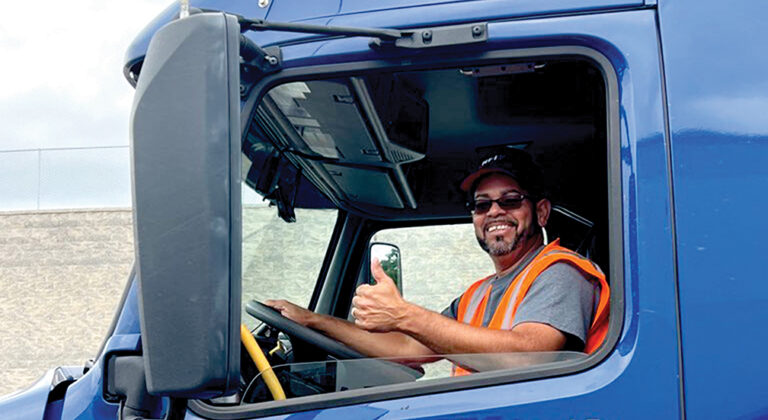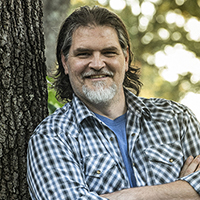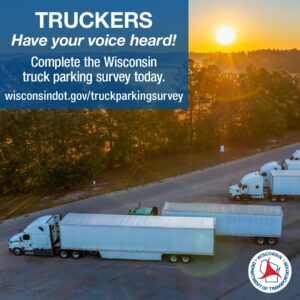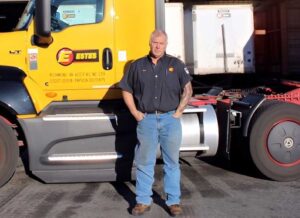For NFI driver Benjamin Rodriguez, trucking is in the bloodline. He comes from a long line of heavy equipment operators in his family, and he says driving a truck was the perfect fit him from the very beginning.
“I was actually born and raised in the U.S. Virgin Islands, and my family members used to drive mostly machinery and trucks,” he said. “I began driving trucks in 1995. I drove for a waste management company; that’s when I started trucking. It was something that I always loved. I had a passion for it.”
Rodriguez’s over-the-road driving career began shortly after earning his CDL at Roadmaster Truck Driving School in Florida in 2008. In the 14 years since then, he says, he’s hauled nearly everything there is.
“I have driven a reefer, I have done dry van, I have hauled anything moving out there — except hazmat. I’ve never done hazmat,” he said. “Even recycled material, recycled plastic, just about anything that’s moving around out there. There was no one specific thing I hauled.”
Rodriguez can boast of touching all of the lower 48 states in his career, in part because in the early days he was on long-haul routes that took him from coast to coast. It was a tough assignment for a family man.
“When I first started in the U.S. I had to do all that kind of work,” he said. “When I started in ’08, at the beginning, it was a little tough because you leave your family behind. You have a responsibility to be home every day and have the time with the family, and then you go out here for four or five weeks out.
“But even though that was a little hard, you know, at the same time I had the support of my spouse, which is good,” he continued. “That really helped a lot in overcoming all these different things through the years.”
An additional challenge was Rodriguez’s natural desire to keep moving and not sit still for long periods. It was something he had to train his body and system to adapt to on long hauls.
“The first two hours of driving, it made me sleepy. I wanted to fall asleep, just in the first two hours,” he said. “The first two hours of driving are always the hardest, but after that your body adapts to what you are doing.”
After making a move to NFI about a year ago, Rodriguez is now on a dedicated run, delivering freight to Big Lots! stores along the East Coast. He said he welcomes the new role because it keeps him closer to his home in Pennsylvania.
“The advantages of doing that is I come to the same place all the time,” he said. “The trailer is always loaded, so that’s a benefit versus when you are an over-the-road driver, where there is a lot of waiting. Here I don’t have to wait. I pick up, I go to the store and make my deliveries. One day there might be some difficulties, but overall, everything runs pretty good. I really like that.
“I deliver to a maximum of four stores a day. The farthest I’ve gone is up to Massachusetts and New York, and as far down as Virginia and a little bit of West Virginia,” he added.
Throughout his career, Rodriguez has prided himself on being a safe driver even when navigating the heavier urban traffic along his current route. As such, he’s happy to have seen trucks evolve technologically over the years.
“The safety features they have are what’s changed the most,” he said. “They are looking for ways to make trucks safer, even with the new system with ELDs. And companies are getting stronger with the safety and making sure that drivers are doing better out there, so that helps out too.”
On the downside, Rodriguez said, safety has become much more difficult to maintain these days, and he sees more challenging situations than ever.
“The stuff with people on their phone, it’s amazing,” he said. “I always try keep on the lookout all the time. Even with the new technology going on in the truck, you have to look out. When you are going to get on the interstate and you are ahead of them, you still have to go on to the shoulder trying to get on. That happens a lot.
“The other thing is, if you are stopped in one place and you make a turn and there’s a turn to the left or the right, as soon as that light changes they just cut in front of you,” he said. “So, all these things make me more and more aware of these crazy things that people are doing because they just show up in the blink of an eye.”
In fact, Rodriguez said, even with all its challenges, the COVID-19 pandemic was actually a much less stressful time to be on the road because so many people were either quarantined or working from home.
“With COVID, I tell you something, (driving) was awesome,” he said. “Traffic was good; you could run smoothly. You didn’t have to worry about people doing all this craziness during that year that people were enclosed at home. Now, it’s back to going crazy.”
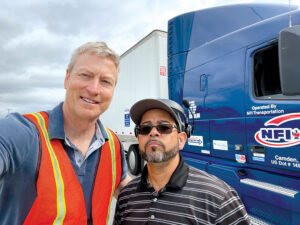
Rodriguez says he believes educating the public about sharing the road with big rigs can help improve overall safety on the road.
“(Drivers need to) see what happens when you slow down in front of a truck,” he said. “These rigs do not stop on a dime.”
In June, The Trucker Media Group’s CEO Bobby Ralston had a chance to experience a day on the road with Rodriguez — complete with rush-hour traffic.
“I was reminded anew of the massive responsibilities these drivers are tasked with, and how our economy relies on the trucking,” Ralston said, adding that drivers are truly the backbone of the industry.
“I was really impressed with Ben’s skill in safely making his way through heavy traffic, as well as the rapport he’s built when interacting with NFI’s customers,” he said.
Dwain Hebda is a freelance journalist, author, editor and storyteller in Little Rock, Arkansas. In addition to The Trucker, his work appears in more than 35 publications across multiple states each year. Hebda’s writing has been awarded by the Society of Professional Journalists and a Finalist in Best Of Arkansas rankings by AY Magazine. He is president of Ya!Mule Wordsmiths, which provides editorial services to publications and companies.







